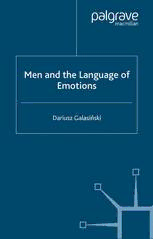Table Of ContentMen and the Language of
Emotions
Dariusz Galasinski
Men and the Language of Emotions
Also by Dariusz Galasinski
CULTURAL STUDIES AND DISCOURSE ANALYSIS (with Chris Barker)
THE LANGUAGE OF DECEPTION
THE LANGUAGE OF BELONGING (with Ulrike Hanna Meinhof)
Men and the Language of
Emotions
Dariusz Galasinski
Professor of Discourse and Cultural Studies
University of Wolverhampton
United Kingdom
© Dariusz Galasinski 2004
Softcover reprint of the hardcover 1st edition 2004 978-0-333-99574-7
All rights reserved. No reproduction, copy or transmission of this
publication may be made without written permission.
No paragraph of this publication may be reproduced, copied or transmitted
save with written permission or in accordance with the provisions of the
Copyright, Designs and Patents Act 1988, or under the terms of any licence
permitting limited copying issued by the Copyright Licensing Agency,
90 Tottenham Court Road, London W1T 4LP.
Any person who does any unauthorised act in relation to this publication
may be liable to criminal prosecution and civil claims for damages.
The author has asserted his right to be identified
as the author of this work in accordance with the Copyright,
Designs and Patents Act 1988.
First published 2004 by
PALGRAVE MACMILLAN
Houndmills, Basingstoke, Hampshire RG21 6XS and
175 Fifth Avenue, New York, N.Y. 10010
Companies and representatives throughout the world
PALGRAVE MACMILLAN is the global academic imprint of the Palgrave
Macmillan division of St. Martin’s Press, LLC and of Palgrave Macmillan Ltd.
Macmillan® is a registered trademark in the United States, United Kingdom
and other countries. Palgrave is a registered trademark in the European
Union and other countries.
ISBN 978-0-230-55431-3 ISBN 978-0-230-51012-8 (eBook)
DOI 10.1057/9780230510128
This book is printed on paper suitable for recycling and made from fully
managed and sustained forest sources.
A catalogue record for this book is available from the British Library.
Library of Congress Cataloging-in-Publication Data
Galasinski, Dariusz.
Men and the language of emotions/Dariusz Galasinski.
p. cm.
Includes bibliographical references and index.
1. Men—Psychology. 2. Men—Identity.
3. Emotions. 4. Masculinity. 5. Men—Language.
I. Title.
HQ1090.G33 2004
155.3′32—dc22 2004051507
10 9 8 7 6 5 4 3 2 1
13 12 11 10 09 08 07 06 05 04
Rodzicom
Contents
Acknowledgements viii
Transcription Conventions ix
1 Men and their Emotions 1
2 Stories of Emotional Masculinity 26
3 ‘There is a Concern’: Strategies of Emotion Talk 47
4 ‘No Worries’, or the Emotional View of Reality 79
5 Emotions of Fatherhood 99
6 Speaking Helplessly: The Emotions of Unemployment 119
7 Masculinity? What Masculinity?! 144
References 157
Index 171
vii
Acknowledgements
This book owes its existence to a number of people who helped or
supported me when I was designing and writing it. To give justice and
thank all of them would be impossible. I would like, however, to
acknowledge my indebtedness to Chris Barker, without whom the idea
of this book would never have formed. Sally Johnson’s comments and
critique made the book much more presentable. Discussions with my
colleagues and especially my graduate students in the University of
Opole, where I held a visiting chair, and particularly with Marzena Ryba
and Olga Kozlowska, provided me with a most fruitful venue to discuss
and try out new ideas. Needless to say, all the book’s shortcomings are
my own.
My thanks also go to Jill Lake, my editor at Palgrave Macmillan, for
starting our conversation in Reading and believing in the book.
Finally, I would like to thank Ola, Michal, and Ania for bearing with
me and making this book a temporary member of our family.
DARIUSZ GALASINSKI
viii
Transcription Conventions
[ beginning of overlapping speech
= latching (no gap or no overlap between stretches of talk)
. falling intonation
? rising intonation
- self-interruption
(.) short pause
(..) longer pause
wo:rd lengthening
WORD emphasis
(word) word unclear
((word)) transcriber’s comment.
ix
1
Men and their Emotions
...where no one has felt before
‘Your desire to explore space is inefficient, your need for familial connections
is a weakness.’ This is how Seven of Nine, one of Star Trek: Voyager’s
main characters, a former human assimilated by the Borg (some dangerous
and violent aliens), described humanity. It is a species driven by emotions.
Indeed, one of Star Trek’s topoi is the juxtaposition of the emotional
humans with the unemotional non-humans. First, there was Mr Spock,
the cool and rational Vulcan, the butt of the volatile Captain Kirk’s jokes
in the original series. Then, in The Next Generation, came Lieutenant
Commander Data, an android in pursuit of humanity, a quest for
(amongst others) the chance to feel human emotions, understand jokes,
and to love Lal, his android ‘daughter’. Seven of Nine, a Borg, on the
other hand, had to be pushed into humanity, especially since it implied
giving up her orderly rationality and espousing the uncontrollability of
emotions. Finally, another Vulcan, Subcommander T’Pol in the latest
series, Enterprise, is also constructed as providing the cool and rational
alternative to her captain’s more cavalier attitude.
One of the significant traits of what it means to be human is to be
able to feel emotions. It is so human that in one of the feature films
based on the television series (Generations), the Data character, who had
by then been equipped with an ‘emotion chip’, cannot handle himself
in a dangerous situation; the emotion is much too much for him to
control. Bewildered by the experience, Data is even more in admiration
of his human ideals, those who are able to feel emotions and not be
overwhelmed by them.
The moment we leave the friendly and not so friendly aliens, or the
more or less likely future, and come back from where no one had gone
1

